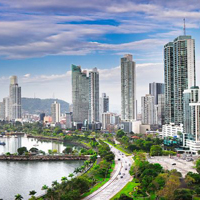Pros and Cons of Living in Panama
Summary: If you're moving to Panama, it's important to learn about both the Pros AND Cons of living in Panama.
Panama, a land of tropical beauty, modern cities, and a melting pot of cultures, has become a beacon for expatriates seeking a change of scenery and pace. Nestled between the Caribbean Sea and the Pacific Ocean, this Central American gem offers a unique blend of urban sophistication and natural splendor. As you consider the possibility of calling Panama your new home, it's essential to weigh the advantages and challenges that come with such a move. From the bustling streets of Panama City to the serene beaches of Bocas del Toro, life in Panama can be as diverse as its landscape. Let's delve into the details and discover what life in Panama has to offer, as well as what potential drawbacks you might encounter.
Pros of Living in Panama
When considering a move to Panama, the list of positives is both extensive and enticing. Expatriates from around the globe have been drawn to this country for a myriad of reasons, ranging from its economic stability to its welcoming climate. One of the most significant advantages of living in Panama is the country's robust economy. As a regional financial hub, Panama offers a stable economic environment and uses the US dollar as its currency, which can simplify financial matters for American expats. The Panama Canal, a marvel of engineering, not only serves as a critical conduit for international maritime trade but also contributes significantly to the nation's economy. The Panamanian government has implemented policies that are favorable to foreigners, including the Pensionado program, which is widely regarded as one of the best retirement systems globally. This program provides retirees with discounts on a variety of services and goods, from medical care to entertainment, making Panama an attractive destination for those looking to stretch their retirement dollars further. Healthcare in Panama is another draw, with modern facilities in Panama City that rival those found in the United States and Europe. Many doctors are bilingual and have received training abroad, ensuring that expatriates have access to high-quality medical care. Additionally, healthcare costs are generally lower than in many Western countries, which can be a significant relief for those concerned about medical expenses. The country's natural beauty is a siren call for nature lovers and adventure seekers. With lush rainforests, pristine beaches, and a plethora of wildlife, Panama is a paradise for outdoor enthusiasts. Whether it's bird watching in the cloud forests of Chiriquí or snorkeling in the clear waters of the San Blas Islands, there is no shortage of activities to engage with nature. Panama's climate is another appealing factor, particularly for those tired of harsh winters. With its tropical climate, Panama offers warm weather year-round, although it's worth noting that there is a rainy season which can bring significant precipitation. Cultural diversity is woven into the fabric of Panamanian society. The country's history as a crossroads of the world has created a melting pot of ethnicities and traditions. This diversity is celebrated in the country's cuisine, festivals, and daily life, providing a rich tapestry of experiences for residents. For those who crave urban living, Panama City presents a skyline that rivals any major metropolis, complete with skyscrapers, bustling nightlife, and a variety of international restaurants. The city's historic district, Casco Viejo, offers a glimpse into the past with its colonial architecture and cobblestone streets, now filled with chic cafes and boutique hotels. The expat community in Panama is thriving, making it easier for newcomers to find friends and settle in. Various social groups and organizations cater to expatriates, providing a support network that can be invaluable when navigating the intricacies of a new country.Cons of Living in Panama
While Panama has much to offer, it's important to acknowledge that expatriate life here is not without its challenges. Before packing your bags, consider some of the potential downsides to living in this tropical nation. One of the most significant issues expatriates may face is the bureaucracy. Dealing with government paperwork, from obtaining residency to registering a vehicle, can be a time-consuming and often frustrating process. The pace of administrative tasks is slower than in many Western countries, and there may be a language barrier if you're not fluent in Spanish. The cost of living, while lower than in many Western nations, can vary greatly depending on your lifestyle and location. Panama City, in particular, can be as expensive as any major city in North America or Europe, especially when it comes to housing in the more desirable neighborhoods. Additionally, imported goods and certain services aimed at expatriates can come with a hefty price tag. While healthcare in Panama is generally of high quality, it can be inconsistent. Outside of Panama City, medical facilities may not meet the standards that some expatriates are accustomed to, and access to specialized care may require travel to the capital. The tropical climate, while a draw for many, can also be a drawback. The heat and humidity can be oppressive, and the rainy season can bring about a host of issues, from flooding to transportation disruptions. Insects, particularly mosquitoes, can be a nuisance and a health concern due to diseases like dengue fever and Zika virus. Traffic congestion in Panama City is notorious, with rush hour turning streets into virtual parking lots. The public transportation system, although improving, may not meet the expectations of those from countries with more developed infrastructure. Cultural differences can also pose a challenge for expatriates. The concept of time is more relaxed in Panama, which can be frustrating for those used to punctuality and efficiency. Adjusting to local customs and business practices requires patience and an open mind. Safety and crime are concerns in certain areas of Panama, as in any country. While many parts of Panama are safe, there are neighborhoods with higher crime rates, and expatriates should take precautions, stay informed, and be aware of their surroundings. Lastly, the language barrier can be a significant hurdle for those who do not speak Spanish. While English is spoken in some areas, particularly in business and tourism sectors, a basic understanding of Spanish is essential for daily life and integration into the local community. Moving to Panama can be an enriching experience, offering a blend of modern amenities and natural beauty. However, it's crucial to approach such a move with a clear understanding of both the benefits and the challenges. By doing so, you can make an informed decision and fully embrace the Panamanian lifestyle should you choose to make this vibrant country your new home.Expats Talk about Pros & Cons of Living in Panama
"Traffic is bumper to bumper during rush hours, stop signs are useless since they don't stop and just slow down.....if you're lucky! If you drive on the highway from Panama City to Costa del Este, you feel like you are going thru a gigantic dumpster with so many garbage on the beaches. (refrigerators, tires, furnitures, etc, etc). Rivers connected to the Pacific ocean in Panana City on Balboa Street and in Coste del Este smell terrible (pee) and you can see garbage floating from these rivers to the Pacific ocean in low tide then back on the beaches (if you can call beaches) on high tide. I asked many questions about this situation as if it was a complete lack of education or lack of interest from the Panamians. Panama is carbon negative for the air so air is pure but the garbage and smell when you cross these rivers are terrible. Walking on the boardwalk of Balboa street crossing a river, you need to pinch or cover your nose, same by crossing a river in Costa del Este and any rivers," commented one member living in Panama City, Panama.
"People like the beauty of nature, the quiet, relaxed atmosphere, the small town feel, the relatively close proximity to Panama City (2-3 hours drive) and the weather (not as hot or humid as Coronado). Dislikes include the frequent power outages, lack of health care facilities, overpopulation of dogs that bark all night, and lack of stores (if want want to buy anything beyond basic necessities you have to drive the curvy, pot-holed mountain road to Coronado (35-45 minutes drive). I hope this is helpful," mentioned one expat living in Panama.
About the Author
 Betsy Burlingame is the Founder and President of Expat Exchange and is one of the Founders of Digital Nomad Exchange. She launched Expat Exchange in 1997 as her Master's thesis project at NYU. Prior to Expat Exchange, Betsy worked at AT&T in International
and Mass Market Marketing. She graduated from Ohio Wesleyan University
with a BA in International Business and German.
Betsy Burlingame is the Founder and President of Expat Exchange and is one of the Founders of Digital Nomad Exchange. She launched Expat Exchange in 1997 as her Master's thesis project at NYU. Prior to Expat Exchange, Betsy worked at AT&T in International
and Mass Market Marketing. She graduated from Ohio Wesleyan University
with a BA in International Business and German.
Some of Betsy's articles include 12 Best Places to Live in Portugal, 7 Best Places to Live in Panama and 12 Things to Know Before Moving to the Dominican Republic. Betsy loves to travel and spend time with her family. Connect with Betsy on LinkedIn.
Additional Information:
- Panama Guide
- Healthcare & Health Insurance in Panama
- Members Talk about Healthcare & Health Insurance in Panama
- Best Places to Live in Panama
- Real Estate in Panama
- Guide to Real Estate in Panama
- Pros & Cons of Living in Panama
- Cost of Living in Panama
- How to Rent a Home in Panama
- How to Enroll in the Public Healthcare System in Panama
- 10 Best Places for Families to Live in Panama
- Getting a Driver's License in Panama
- 2025 Guide to Living in Panama
- Pros and Cons of Living in Panama 2025
- 2025 Guide to Moving to Panama
- More Advice about Retiring in Panama
- Members Talk about the Cost of Living in Panama




